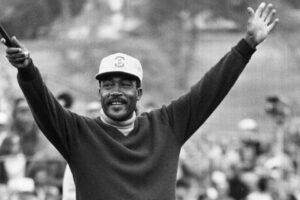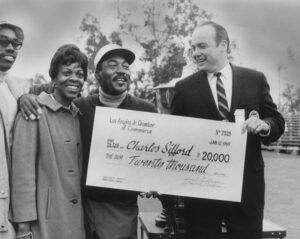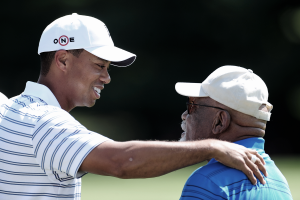Charlie Sifford’s lasting legacy
The list of PGA TOUR winners in Los Angeles is a who’s who of the golf world. To pick the greatest of the PGA TOUR winners in LA would be too difficult a task. But to pick the most impactful, look no further than Charlie Sifford’s tournament victory in 1969.
For Sifford, his 1969 win in LA was the second, and final victory of his PGA TOUR career. More than 50 years later, the win symbolizes much more. It is the culmination of an uphill battle that Sifford championed and won. Sifford began playing professional golf in 1948, but not on the PGA TOUR. At that time, the Professional Golfers Association of America had a ‘Caucasians only from North or South America’ requirement that limited Sifford’s, and other minority golfers, ability to obtain their professional card. So, Sifford played where he could. And he won. Six Negro Open victories, including five straight from 1952 to 1956, and in 1957, Sifford won the Long Beach Open, topping a field that included many PGA golfers. In 1960, Sifford received an “approved player card” from the PGA, and upon the association dropping its ‘Caucasian only’ stipulation, earned his full membership in 1961.
Sifford began playing professional golf in 1948, but not on the PGA TOUR. At that time, the Professional Golfers Association of America had a ‘Caucasians only from North or South America’ requirement that limited Sifford’s, and other minority golfers, ability to obtain their professional card. So, Sifford played where he could. And he won. Six Negro Open victories, including five straight from 1952 to 1956, and in 1957, Sifford won the Long Beach Open, topping a field that included many PGA golfers. In 1960, Sifford received an “approved player card” from the PGA, and upon the association dropping its ‘Caucasian only’ stipulation, earned his full membership in 1961.
Throughout the sixties, Sifford would play consistently, sometimes contending to win. Contending turned to triumphing in 1967. Finishing 12-under par for the tournament, Sifford edged the field by a single stroke to win the Greater Hartford Open Invitational, becoming the first minority golfer to win a PGA TOUR event.
The significance of Sifford’s win in Hartford should not be understated. The list of previous winners of that event included Arnold Palmer, Sam Snead and Billy Casper. But the event was relatively new, with Sifford winning the tournament in its 16thplaying.
Fast forward to the 1969 Los Angeles Open. An event that had been contested every year since 1926, except in 1943 due to World War II. Sifford, who had served in the army during World War II, had control of the historic tournament from his opening round, firing an eight-under 63 in round one. Over a six hole stretch on his second nine, Sifford had five birdies and an eagle to move atop the leaderboard of the season’s opening event.
Over his next three rounds at Rancho Park, Sifford shot par 71s to finish ahead of all but one player, Harold Henning, who finished tied with Sifford after four rounds. On the first hole of the playoff, Sifford took aim at the flagstick with his second shot, rolling the ball just four feet short of the hole. Henning, having missed the green with his second shot, finished the playoff hole with a par, setting the scene for Sifford’s birdie putt to win the LA Open. Sifford didn’t miss.
The scene was electric at Rancho Park when Sifford sunk the tournament-winning putt. An African-American journalist rushed the putting green to plant a kiss on Sifford. The galleries cheered. Dodgers’ legend Don Newcombe was on hand to see Sifford’s win, and ran out to lift Sifford’s arms in victory. Over half a century after Sifford’s victory in LA, his legacy remains historic. He opened the door for minority golfers and underrepresented players from around the world. The Genesis Invitational has awarded an exemption to a minority golfer in Sifford’s name since 2009. Tiger Woods had a close relationship with Sifford before his passing, speaking on many occasions how Charlie helped open doors for Woods to play golf as a youth. It is only fitting that Tiger’s TGR Live manages the event with proceeds benefiting Woods’ charity, TGR Foundation.
Over half a century after Sifford’s victory in LA, his legacy remains historic. He opened the door for minority golfers and underrepresented players from around the world. The Genesis Invitational has awarded an exemption to a minority golfer in Sifford’s name since 2009. Tiger Woods had a close relationship with Sifford before his passing, speaking on many occasions how Charlie helped open doors for Woods to play golf as a youth. It is only fitting that Tiger’s TGR Live manages the event with proceeds benefiting Woods’ charity, TGR Foundation.

In 2014, President Barak Obama awarded Sifford the Presidential Medal of Freedom. When asked how receiving the medal compared to playing for a major, Sifford responded “No major compares to this,” being only the third golfer to receive a Presidential Medal of Freedom, following Arnold Palmer in 2004 and Jack Nicklaus in 2005.
While the honors and medals are something to be appreciated, Sifford repeatedly stated that he just “wanted to play golf.” And now, for many on the PGA TOUR, honoring his legacy with an exemption at The Genesis Invitational allows young and ambitious golfers, like Sifford, to do just that.
CELEBRATING 100 YEARS
The Genesis Invitational continues a longstanding tradition of professional golf in Los Angeles. Debuting in 1926 as the Los Angeles Open at Los Angeles Country Club, the tournament was staged at various courses around the Los Angeles area before finding its permanent home at The Riviera Country Club. For a century the tournament has played host to iconic moments, legendary champions and defining chapters in the game of golf. In this special series, we look back on a century of tournament history and Celebrating 100 years of memorable golf stories.
